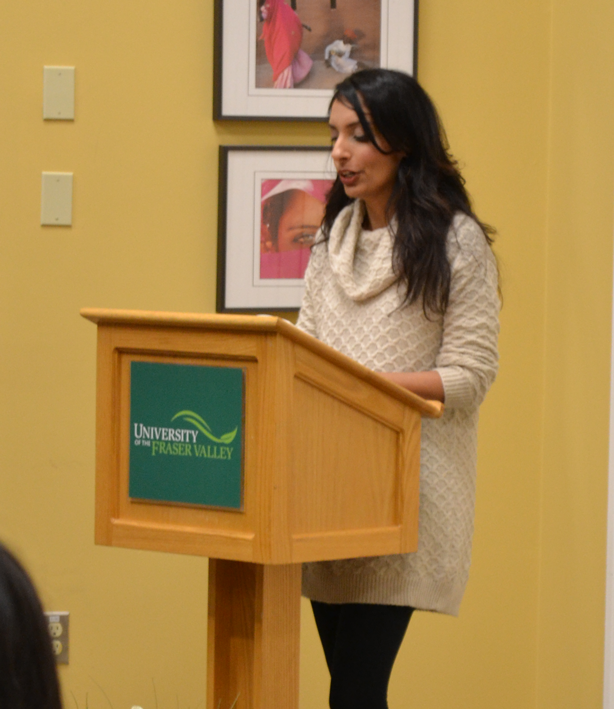Print Edition: November 27, 2013

The Centre for Indo-Canadian Studies hosted its 7th annual South Asian Readers and Writers Festival on the evening of November 21. The event started off slowly as people mingled, and snacked on samosas and citrus water. Guests were greeted kindly by centre coordinator Sharanjit Sandhra, and as the room filled people took seats and waited eagerly to hear the authors read their pieces.
First to read was Raminder Sidhu from her first novel, Tears of Mehndi, which explores the lives of a tight-knit community in Vancouver’s Little India. The opening introduces a female narrator, who seems to struggle choosing between traditional upbringings and the different values of the West. The scene sets us in a household where we grasp hints of family drama, including a mystery surrounding a missing woman. Sidhu ended the reading just before a reveal, teasing the audience and leaving them wanting more.
Lieutenant colonel Pritam Singh Jauhal, or “Uncle” as Sandhra affectionately referred to him, read a short excerpt of his autobiography A Soldier Remembers. The book is a collective effort written by members of the Centre for Indo-Canadian Studies and Jauhal, and is due for publication on November 30. Being a decorated war veteran and a man who devoted 20 years of his life to his country, Jauhal shared his experience of discrimination and blatant racism during a Rememberance Day ceremony at the Surrey Newton Legion Branch in 1993.
“The two attendants stopped me,” he said, “and the one told me I could not enter, because I had a turban on my head… I have never been so utterly humiliated.”
Jauhal said that even though he’s been a fighter all his life, that was his most public battle. A Soldier Remembers is about Jauhal’s struggle with the Legion, but ultimately chronicles the struggles and accomplishments of a Sikh-Canadian, and his lifelong service to his community and country. The reading was brilliant.
The third reading was done by Hugh Johnston from Jewels of the Qila, which delves into a history of an immigrant community through the eyes of the Siddoo family. The reading was deep and detail-oriented, taking note of family connections and geography while also mingling all the elements of a historical autobiography with those of creative non-fiction. Johnston ended the reading powerfully.
Last was poet Ashok Bhargava reading from Lost in the Morning Calm, a compilation of poetry he translated from Korean. The poems, he explained, were given to him by a Korean exchange student who wanted her father’s work to go to someone who would appreciate his poetry. Bhargava said he didn’t know what to do with them, because they were written in Korean.
So, he said simply, “I learned Korean.”
The poems were simply put, yet moving. Bhargava held the audience in awe until the very last word of poetry.
With the readings wrapped up, the floor was open for the audience to ask questions of the authors, and some people shuffled back toward the samosa table for something spicy to keep them warm on a frigid November night.

